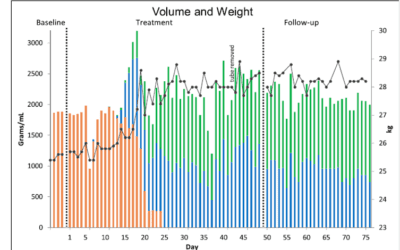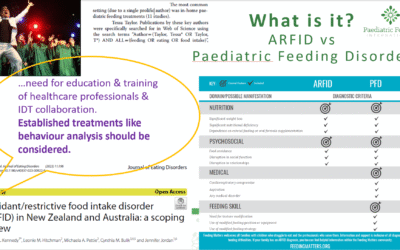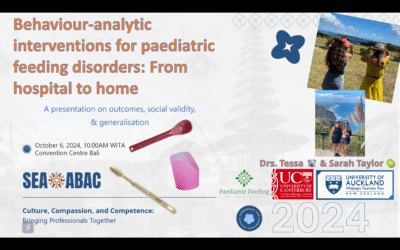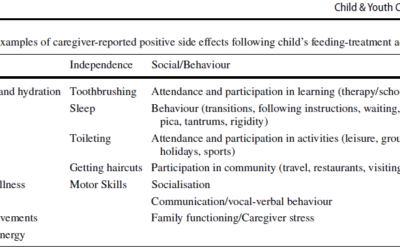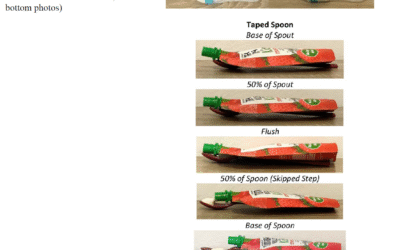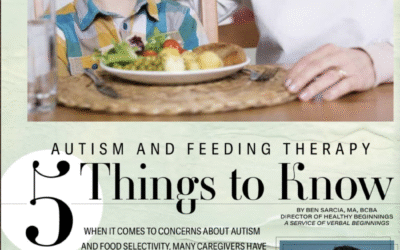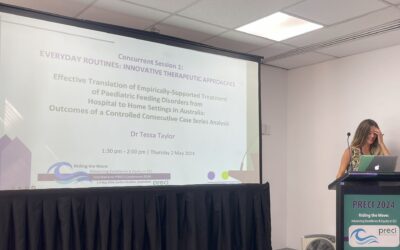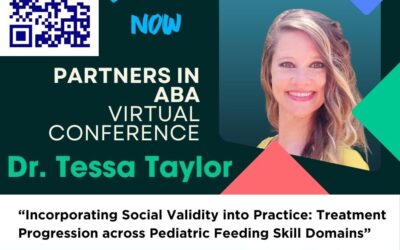Feeding Forward: From Fussy to Foodie
Serving up paediatric feeding insights to progress from picky to plating:
Little bites, big leaps
Stirring up clinical research, in-depth case studies, and practical guides, a curated information hub and treasure trove distilling years of dedicated study and firsthand experience into actionable knowledge, designed to be a go-to resource for caregivers, clinicians, and researchers. We strive to empower those navigating paediatric feeding challenges with cutting-edge knowledge that fuels innovation and transforms care. #GumbeauxYaYa #CaC’estBon #AllonsManger #Bam!
This information is provided for reference only. The content is not intended to advertise specific outcomes or create unreasonable expectations. Therapeutic decisions should be made in consultation with a registered health practitioner. Information provided is not a substitute for professional medical advice.
Explore Our Content
Organised into accessible sections, whether you’re exploring featured insights, diving into publications, accessing practical resources, or engaging with leading presentations, each category offers a deeper understanding of the application of evidence-based strategies.
Research
Dive into the gateway to our latest peer-reviewed literature on paediatric feeding.
Stay informed with our comprehensive reviews and detailed commentary on the work and research excellence that laid the groundwork for evidence-based practice in feeding.
Explore in-depth clinical analyses on feeding interventions.
Packed with a wealth of user-friendly guides, downloadable materials, and practical overviews, breaking down complex challenges into tangible support for identifying and addressing day-to-day feeding challenges.
Curated from years of hands-on experience and study, these tools empower parents, professionals, and investigators alike seeking to improve feeding outcomes.
Featuring engaging lectures, conference talks, and webinar recordings on feeding evaluation and strategies.
Multi-media content born from expertise on translating research into real-world application.
Stay inspired by engaging with dynamic content on the latest advances in feeding therapies.
Highlighted Insights
Featured & Latest Content
Discover our curated selection of essential reads that provide invaluable insights into paediatric feeding. These articles are handpicked for their relevance and impact, showcasing key topics and innovative solutions, exemplifying the transformative work in advancing paediatric feeding science and practice.

Continuous Saliva Packing Resulting in Feeding Tube Dependence: In-Home Behaviour-Analytic Treatment
A nine-year-old, healthy boy – suddenly stopped swallowing even his own saliva, which caused a huge regression in his life. He was no longer speaking or using his hands, stopped participating in activities, was back in nappies, out of school, and not sleeping.
The moment when he finally swallowed some saliva, we were all crying and couldn’t believe it. His mum was jumping up and down, hugging him and celebrating. The process took 7 weeks but he finally got off his NG tube, gained weight, and reached a variety of 94 foods across food groups.
ARFID: Dr. Kennedy’s review in NZ & Auz–Finally an author finds the paediatric feeding disorder literature!
For ARFID, there is a need for education and training of healthcare professionals and IDT collaboration. Established treatments like behaviour analysis should be considered.
the Blend mag 4: Why is ARFID 🍝 having a moment 🐝🔥📈💡🤔🔍? ARFID Explained.
You’re not alone. You may hear that children will grow out of it, eat if hungry, are fine if they’re not underweight, or are not ready for feeding intervention. But research suggests this is not the case and, in fact, the problems can worsen over time.
Feeding difficulties are complex and people need the right help – and this support is available. It can work quickly and have rippling positive effects into other areas for the person and their loved ones.
¡No te pierdas esta oportunidad de aprender con presentadores que vienen desde Australia y enriquecer tu conocimiento en un área crucial de la salud infantil! 🌏💙
🥢🍣 Massive HEAPS giddy & stoked for this new talk for Puerto Rico (PRABA)! “Independencia de habilidades a la hora de comer: Transición del pouch a la cuchara al uso de palillos chinos.” Beyond special to have real detailed live action progress VIDEOS and adorableness to show! Can’t wait!...
SEA ABAC 2024 in Bali with Dr. Sarah Taylor
🥝 🐨 Me & my long-term "pen pal" of almost 10 years and >10 pubs later Dr. Sarah Taylor will finally be in person together for the 1st time in Bali! 🧐 🤔 ❔ ⁉ No, we are not at all related. ❔ ⁉ No, we don't actually work together. ❔ ⁉ No, I don't even live in New Zealand. 🥝 🐨 Thanks heaps to...
New clinical psychology supervision directory
RESEARCH
Continuous Saliva Packing Resulting in Feeding Tube Dependence: In-Home Behaviour-Analytic Treatment
A nine-year-old, healthy boy – suddenly stopped swallowing even his own saliva, which caused a huge regression in his life. He was no longer speaking or using his hands, stopped participating in activities, was back in nappies, out of school, and not sleeping.
The moment when he finally swallowed some saliva, we were all crying and couldn’t believe it. His mum was jumping up and down, hugging him and celebrating. The process took 7 weeks but he finally got off his NG tube, gained weight, and reached a variety of 94 foods across food groups.
ARFID: Dr. Kennedy’s review in NZ & Auz–Finally an author finds the paediatric feeding disorder literature!
For ARFID, there is a need for education and training of healthcare professionals and IDT collaboration. Established treatments like behaviour analysis should be considered.
Collaboration across 4 clinics in 3 countries, beyond happy ☺️ & grateful 🙏 for the opportunity to team up🫛🥕with Drs. Phipps, Peterson, & S.A. Taylor! Everything you ever wanted to know about social validity in feeding:
“Collectively, caregivers rated behaviour-analytic treatments high in social validity and treatments were highly effective. Caregivers reported increased broader quality of life and lasting positive impacts, decreased stress, and lack of negative effects.”
“Accurate dissemination is needed to increase earlier access to effective feeding treatment for families and specialised training for professionals to promote data-based and individualised decision-making in this vital area.”
“Open…close…FUN!” 🥢 🍣 New free full-text article “Mealtime skill independence: From pouch-to-spoon fading to using chopsticks”
11 skills in just 2 weeks! Took tedious hard work, but he eventually was a little chopstick expert, even with small vitamins. Another one of my favourite/tippie-top treatment arrangements, plus important novel cultural caregiver perspectives shared including on social validity.
Social Validity: Reactions to Exposure
Low percentages of children have negative reactions to exposure, these reactions are brief, positive results are quick, and parents receiving proper support rate treatment highly positively.
“Given the majority of the patients had ng or g-tube dependence and nearly half met failure-to-thrive, these robust outcomes are quite promising for those with pediatric feeding disorders.”
New free full-text article “Incorporating social validity into practice: Treatment progression across pediatric feeding skill domains”
On multimodal social validity assessment (including direct objective recipient measures) with heaps of practical implications, and one of my most preferred/tippie top/fun treatment arrangements and data collection keys to add (h = happy) ever. Variety record 224 🥇
RESOURCES
ARFID: Dr. Kennedy’s review in NZ & Auz–Finally an author finds the paediatric feeding disorder literature!
For ARFID, there is a need for education and training of healthcare professionals and IDT collaboration. Established treatments like behaviour analysis should be considered.
the Blend mag 4: Why is ARFID 🍝 having a moment 🐝🔥📈💡🤔🔍? ARFID Explained.
You’re not alone. You may hear that children will grow out of it, eat if hungry, are fine if they’re not underweight, or are not ready for feeding intervention. But research suggests this is not the case and, in fact, the problems can worsen over time.
Feeding difficulties are complex and people need the right help – and this support is available. It can work quickly and have rippling positive effects into other areas for the person and their loved ones.
New clinical psychology supervision directory
Dr. Pat Friman: “Stop treating anxiety like a chronic illness”
In the podcast of hashtag#DrPatFriman, Matt Cicoria chats about breaking down misconceptions about anxiety. Pat explains that anxiety isn’t something we have like a disease—it’s a fear of things that won’t actually hurt us.
The conversation gets even more interesting when Pat shares an eye-opening technique used by Steve Hayes. He demonstrates how our minds connect unrelated things through language, expanding our fears unnecessarily. …
Pat also touches on how the mental health industry has convinced many to treat anxiety as a chronic illness when in reality, it’s about understanding and managing our responses.
Discover practical tips on handling anxiety and changing your perspective on fear. Don’t miss out on this enlightening episode!
Collaboration across 4 clinics in 3 countries, beyond happy ☺️ & grateful 🙏 for the opportunity to team up🫛🥕with Drs. Phipps, Peterson, & S.A. Taylor! Everything you ever wanted to know about social validity in feeding:
“Collectively, caregivers rated behaviour-analytic treatments high in social validity and treatments were highly effective. Caregivers reported increased broader quality of life and lasting positive impacts, decreased stress, and lack of negative effects.”
“Accurate dissemination is needed to increase earlier access to effective feeding treatment for families and specialised training for professionals to promote data-based and individualised decision-making in this vital area.”
Feeding Therapy: 5 Things to Know by Ben Sarcia
“…many caregivers have questions that are both specific and challenging. The starting point to answering them is oftentimes the pediatrician, which is a great first step, except that most pediatricians aren’t equipped to deal with the complexity of feeding issues and autism.”
“Sadly, many children have suffered as a result of delayed treatment because of bad information. And speed matters when it comes to effective treatment.”
PRESENTATIONS
¡No te pierdas esta oportunidad de aprender con presentadores que vienen desde Australia y enriquecer tu conocimiento en un área crucial de la salud infantil! 🌏💙
🥢🍣 Massive HEAPS giddy & stoked for this new talk for Puerto Rico (PRABA)! “Independencia de habilidades a la hora de comer: Transición del pouch a la cuchara al uso de palillos chinos.” Beyond special to have real detailed live action progress VIDEOS and adorableness to show! Can’t wait!...
SEA ABAC 2024 in Bali with Dr. Sarah Taylor
🥝 🐨 Me & my long-term "pen pal" of almost 10 years and >10 pubs later Dr. Sarah Taylor will finally be in person together for the 1st time in Bali! 🧐 🤔 ❔ ⁉ No, we are not at all related. ❔ ⁉ No, we don't actually work together. ❔ ⁉ No, I don't even live in New Zealand. 🥝 🐨 Thanks heaps to...
PRECI (Professionals & Researchers in Early Childhood) Conference
Early empirically-supported treatment for paediatric feeding is paramount to most areas of a child’s life, but largely limited to multidisciplinary hospitals in USA. Most children internationally are not receiving effective timely treatment. We present controlled outcomes of successful translation of solely behaviour-analytic treatment to in-home Australia with gains maintained to 2 years. This can have enduring rippling benefits and prevent significant impact to child development/health and waste of critical time/funding.
Join Empire State University Center for Autism Advocacy: Research, Education, and Supports (CAARES) and the Anderson Center for our Partners in ABA Conference, Everyday ABA: Advancing Quality of Life & Advocacy
Register now for the Partners in ABA Conference to join Dr. Tessa Taylor, Ph.D., BCBA-D for “Incorporating Social Validity into Practice: Treatment Progression Across Paediatric Feeding Skill Domains.”
Speaker Spotlight
Dr. Taylor is the founder of Paediatric Feeding International (AUZ) in addition to serving at the University of Canterbury e Whare Wānanga o Waitaha (NZ). Her session will focus on outcome measures in pediatric feeding intervention and methods to assess social validity.
Feeding/ARFID/Tube Presentation at the 2024 APS College of Clinical Psychologists Conference in Adelaide, 22 – 24 March 2024
I look forward to presenting "Empirically-Supported Treatment for Paediatric Feeding/ARFID: Tube Feeding to Eating, Hospital to Home" at the 2024 APS College of Clinical Psychologists Conference in Adelaide, 22 - 24 March 2024.I invite you to join me in attending and making the most of this...
ありがとう ございますArigato gozaimasu to Dr. Tanaka for inviting me as a guest lecturer on paediatric feeding 小児の摂食 for the ABA Sapporo & Asia Pacific ABA Network course sequence in Japan
…and for having the impressive talent to translate my accent! Small world finding connections between feeding, linguistics, communication, and dentistry!
https://www.abasapporo.net/
Stay Informed with Our Latest Updates
Join our community to receive the latest insights, resources, & updates on paediatric feeding directly to your inbox. Stay ahead with carefully curated content tailored for you.
Founder of of Paediatric Feeding International https://www.paediatricfeedingintl.com/about-us/
TOPICS
paediatric feeding disorder (PFD) | avoidant/restrictive food intake disorder (ARFID) | gastrostomy tube/G-tube, nasogastric tube/NG-tube | tube weaning/dependency, transition from tube to oral | failure to thrive/faltering growth/growth impairment | nutritional deficiencies | inappropriate mealtime behaviour (IMB) | food refusal/selectivity | fussy/picky/selective eater/eating | oral/eating/food aversion/sensitivities | mealtime independence/skills | gagging, coughing, vomiting | temperature/preparation/brand/colour/cutlery/crockery selectivity | setting/time/feeder selectivity | out of seat (not sitting at table) | caregiver stress, dreading mealtimes | constipation | dehydration | low appetite/skipping meals, grazing | applied behaviour analysis (ABA) | behaviour-analytic/behavioural treatment/therapy/support/services | in-home therapy/translation | autism, developmental delay, intellectual disability | premie/prematuriy/premature birth | food allergy | reflux


